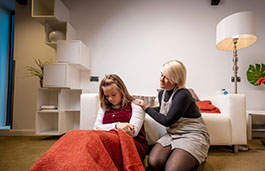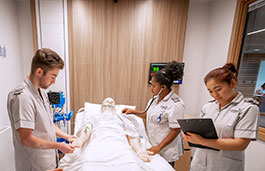Search
Midwifery BSc (Hons)
Study level: UndergraduateProfessionally Accredited Programmes
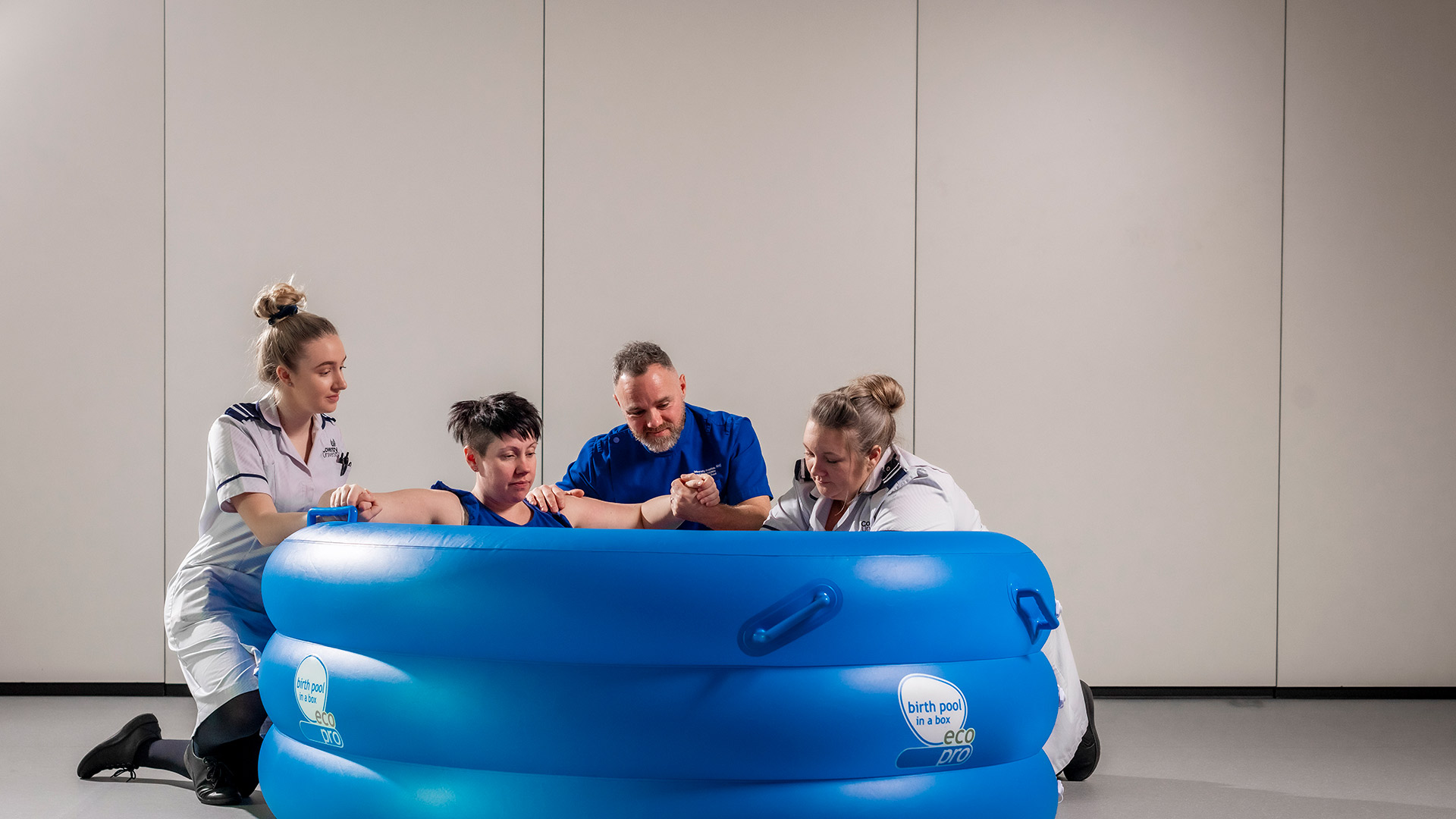
Our Midwifery BSc (Hons) degree provides aspiring midwives with a comprehensive curriculum to prepare for the crucial role of supporting women, babies and their families throughout pregnancy and childbirth.
Course features
Year of entry
2026-27
Location
Coventry University (Coventry)
Study mode
Full-time
Duration
3 years full-time
Course code
HU08
Start date
September 2026
Course overview
Midwives have an essential role in assisting women, babies and their families during pregnancy, childbirth and the postnatal period. This course aims to empower you to become a compassionate, skilled and culturally competent midwife, committed to providing excellent care to women and their families during a transformative time in their lives.
- Our approach supports you to develop a strong sense of professional identity as a midwife from the outset.
- Prepares you to promote optimal maternal and newborn health outcomes, support informed decision-making and advocate for social justice within diverse communities.
- Focus on one academic module at a time, with five weeks of learning followed by one week of assessment per module.
- 50% of your learning will take place in diverse practice-based learning environments2,5. You’ll have the chance to apply theoretical knowledge to real-world practice while being supported by experienced registered professionals including practice supervisors, practice assessors and practice development midwives.
- Successful completion of this course makes you eligible to apply for professional registration as a midwife with the Nursing & Midwifery Council (NMC) (please see Accreditation section for more information).
- All eligible students on this course can apply for a minimum payment from the government of £5,000 per year6. You can apply for additional payments if you incur childcare costs.
Rated Gold Overall
Teaching Excellence Framework (TEF) 20235 QS Stars for Teaching and Facilities
QS Stars University RatingsTop 5 Student City in England (Coventry)
QS Best Student Cities Index 2026Why you should study this course
We aim to develop you into a midwife who improves and impacts the lives of mothers, newborn infants and communities with clinical competence, compassionate care and evidence-informed practice.
- Taught by experienced registered midwives who will support you in developing the knowledge, skills and abilities to deliver professional, impactful, evidence-informed care.
- Learn to collaborate and thrive across and within multidisciplinary teams to coordinate evidenced-based, safe care delivery.
- Develop your leadership skills and critical thinking.
- Supportive learning environment that values diversity, equity and inclusion.
- Engage in simulated practice that closely mirrors the real-world scenarios you will encounter in your future career.
- Focusing on digital fluency, curiosity, critical and reflective thinking, this course instils you with the ability to access, evaluate and apply evidence to inform your practice.
- Access to success coaches and placement supervisors as well as specialist support for mathematics and academic writing4.
Our placement trusts
Your practice placements aim to shape your future as a compassionate and skilled midwife2,5. Our midwifery degree is supported by three main trusts which have all maintained a CQC rating of ‘Good’ for safety.
- George Eliot Hospital Maternity Services: With a CQC rating of ‘Good’, George Eliot Hospital provides a nurturing environment for your clinical placements, where you will find visible and effective leadership. You’ll learn from committed professionals who prioritise safety, personalised care and women's wellbeing.
- South Warwickshire University NHS Foundation Trust Maternity Services: At SWFT, you’ll thrive in an ‘Outstanding, well-led’ CQC-rated setting. Here, safe compassionate care is celebrated, and staff are dedicated to continual improvement. Their highly committed approach to leadership ensures a supportive and inclusive learning experience.
- UHCW Maternity Services: UHCW is the first trust to achieve an ‘Outstanding’ rating for ‘well-led’ in the national maternity inspection programme. The trust focuses on personalised care, safety and what matters most to women and birthing individuals.
Studying in the School of Health and Care
Gain the skills and experience to transform lives, communities and the future of healthcare delivery. We aim to empower you to become a stand-out healthcare professional, capable, competent and confident in your field and role within the wider healthcare team.
While continuously developing your sense of professional identity as a midwife from day one, you'll also collaborate with learners from other School of Health and Care fields, learning in an environment that puts inclusivity, diversity and dignity at its heart.
for Midwifery
Guardian University Guide 2025
Accreditation and professional recognition
This course is accredited1 and recognised by the following body:
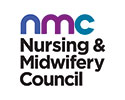
UK Nursing & Midwifery Council (NMC)
The Midwifery BSc (Hons) programme is approved by the Nursing & Midwifery Council (NMC) for the 2026-27 intake.1
Nursing at Coventry University
We have an excellent reputation for the quality of the education provided to trainee and qualified nurses.
Why study with us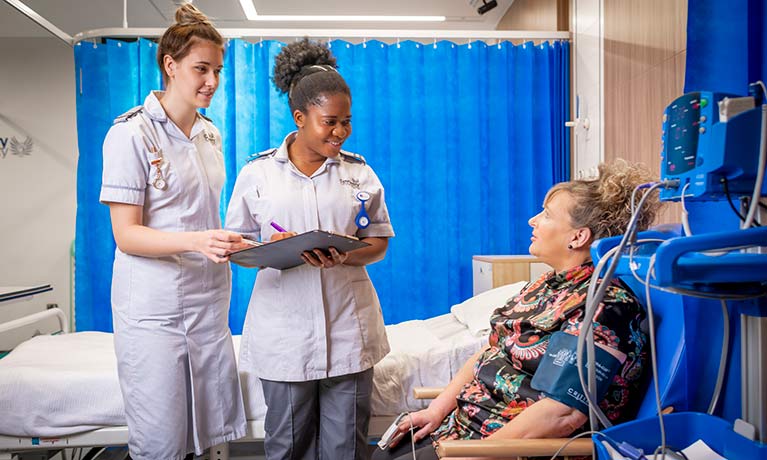
Hope’s journey to becoming a qualified midwife
After overcoming a lifelong fear of hospitals, Coventry University graduate Hope Jezzard is now a qualified midwife, highlighting the personal and academic journey that led to a career in healthcare.
Read more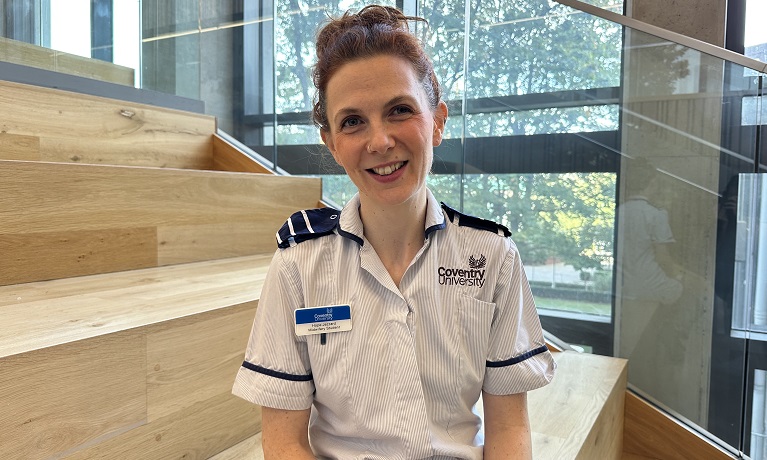
What you'll study
The pre-registration midwifery degree prepares you to become a qualified midwife, focusing on comprehensive care for mothers and newborns. You will study anatomy, physiology and pathologies related to pregnancy and childbirth and will be supported to develop safe skills related to midwifery practice. The curriculum includes both theoretical knowledge and practical skills, covering antenatal, intrapartum, postnatal and neonatal care. You will have the opportunity to gain hands-on experience through clinical placements in hospitals and community settings2,5, developing competence in supporting and managing normal and complex pregnancies and births.
We regularly review our course content, to make it relevant and current for the benefit of our students. For these reasons, course modules may be updated.
How you'll learn
We understand that everyone learns differently, so this course will consist of structured teaching sessions which can include:
- lead lectures which may be delivered online or face-to-face
- seminars
- workshops
- student-led group work
- self-directed learning
- reflectivity
- experiential learning
- skills and simulation.
Teaching contact hours
As a full-time undergraduate student, you will study modules totalling 120 credits each academic year. A typical 20-credit module requires a total of 200 hours study. This is made up of teaching contact hours, guided and independent study.
Teaching hours
Teaching hours vary depending on year of study and module. During your first year you can expect 10-12 teaching hours each week. You will also have the option to attend optional sessions including time with a progress coach or to meet with staff for advice and feedback. As you progress through your studies, teaching hours may reduce.
Practice-based learning
Practice-based learning forms an essential and significant part of your learning experience. Practice hours will differ between placements and different health and care courses. You will have access to university staff, but should expect to spend the majority of your contact time with practice collaborators undertaking placement activity. Overall, the hours you undertake in practice-based learning will need to satisfy the eligibility requirements set by the professional body regulating profession, the NMC. No less than 2300 practice-based hours will need to be completed over the course of your degree.
Guided and independent study
Throughout your studies, you will be expected to spend time in guided and independent study to make up the required study hours per module. You’ll be digging deeper into topics, review what you’ve learned and complete assignments. This can be completed around your personal commitments. As you progress through your studies, you’ll spend more time in independent study.
Online learning
As an innovative university, we use different teaching methods including online tools and emerging technologies. So, some of your teaching hours and assessments may be delivered online.
Assessment
This course will be assessed using a variety of methods which will vary depending upon the module.
Assessment methods may include:
- written assignments
- practice placement2,5
- phased tests
- simulations
- Objective Structured Clinical Examinations
- presentations
- vivas
- dyad*
- portfolios of evidence.
*A dyad is an assessment involving the student and an expert where they really take time to assess student learning in the real-life setting.
The Coventry University Group assessment strategy ensures that our courses are fairly assessed and allows us to monitor student progression towards the achieving the intended learning outcomes.
Entry requirements
Typical entry requirements:
Fees and funding
| Student | Full-time | Part-time |
|---|---|---|
| UK, Ireland*, Channel Islands or Isle of Man | 2026/27 fees TBC 2025/26 fees: £9,535 per year |
Not available |
A non-repayable grant of £5,000 and extra payments worth up to £3,000 may be available to eligible students for each year of study6. Read more about this in the NHS Learning Support Fund information booklet.
For advice and guidance on tuition fees and student loans visit our Undergraduate Finance page and see The University’s Tuition Fee and Refund Terms and Conditions.
The University will charge the tuition fees that are stated in the above table for the first Academic Year of study. The University will review tuition fees each year. For UK (home) students, if Parliament permits an increase in tuition fees, the university may increase fees for each subsequent year of study in line with any such changes. Note that any increase is expected to be in line with inflation.
For international students, we may increase fees each year, but such increases will be no more than 5% above inflation. If you defer your course start date or have to extend your studies beyond the normal duration of the course (e.g. to repeat a year or resit examinations) the University reserves the right to charge you fees at a higher rate and/or in accordance with any legislative changes during the additional period of study.
We offer a range of International scholarships to students all over the world. For more information, visit our International Scholarships page.
Tuition fees cover the cost of your teaching, assessments, facilities and support services. There may be additional costs not covered by this fee such as accommodation and living costs, recommended reading books, stationery, printing and re-assessments should you need them. Find out what's included in your tuition costs.
The following are additional costs not included in the tuition fees:
- Any optional overseas field trips or visits: £400+ per trip.
- Any costs associated with securing, attending or completing a placement (whether in the UK or abroad).
*Irish student fees
The rights of Irish residents to study in the UK are preserved under the Common Travel Area arrangement. If you are an Irish student and meet the residency criteria, you can study in England, pay the same level of tuition fees as English students and utilise the Tuition Fee Loan.
**EU Support Bursary
Following the UK's exit from the European Union, we are offering financial support to all eligible EU students who wish to study an undergraduate or a postgraduate degree with us full-time. This bursary will be used to offset the cost of your tuition fees to bring them in line with that of UK students. Students studying a degree with a foundation year with us are not eligible for the bursary.
Facilities
The Alison Gingell Building is designed to foster hands-on learning experiences, emphasising the unique challenges and responsibilities you will encounter in your new career4. This includes hands-on experience with our cutting-edge healthcare simulation facilities which include a dedicated midwifery suite, two community houses, an ambulance, hospital wards, an intensive care unit and an operating theatre.
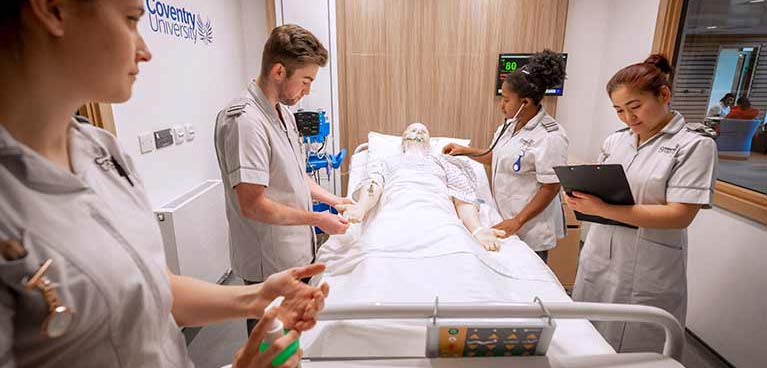
Alison Gingell Building
Our Alison Gingell Building features mock hospital wards built to NHS standards, an operating theatre, critical care settings and other real-life nursing environments.
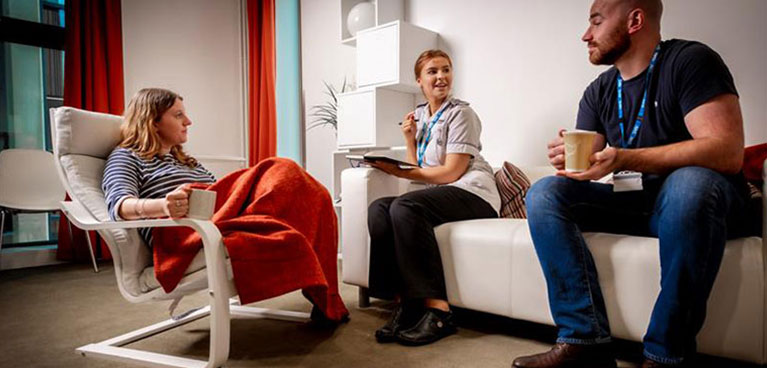
Community houses
Learn how to work with patients outside of a hospital setting in our simulated, two full-size community homes, specifically built for teaching.
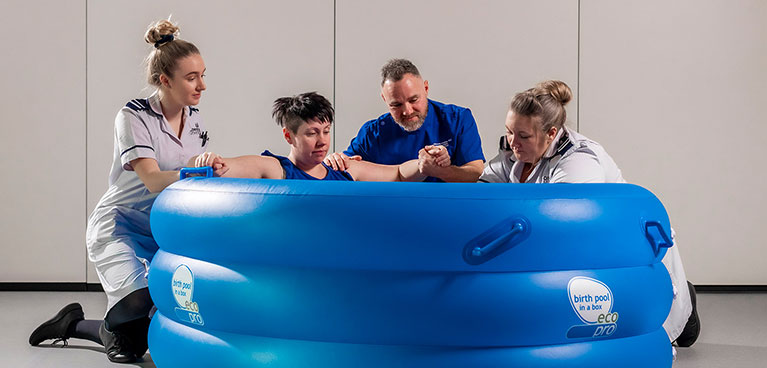
Midwifery suite
Our midwifery suite is equipped with delivery facilities including water birth options. Student midwives also use mannequins to simulate routine and emergency care for mothers and babies.
Take a closer look at our facilities
Discover the facilities for our Nursing, Midwifery and Healthcare subjects. Designed to reflect authentic healthcare environments, you can get hands-on experience applying what you’ve learned to real-world situations.
Facilities are subject to availability. Access to some facilities (including some teaching and learning spaces) may vary from those advertised and/or may have reduced availability or restrictions where the university is following public authority guidance, decisions or orders.
Careers and opportunities
As a newly qualified midwife, you have a variety of career opportunities available to you. You can work in a hospital, providing care in labour and delivery wards, antenatal and postnatal units, and neonatal intensive care units. Community midwifery roles involve visiting patients at home, running antenatal clinics and offering postnatal support.
Midwives can also pursue roles in specialised areas such as maternal mental health, breastfeeding support or high-risk pregnancy care. Additionally, opportunities exist in education and research, public health and international midwifery, providing diverse pathways for career growth and specialisation.
How to apply
You may also like
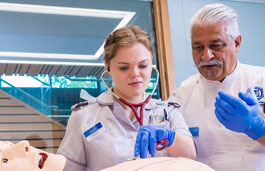
Adult Nursing BSc (Hons)
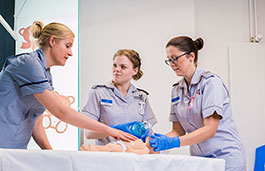
Children and Young People's Nursing BSc (Hons)
